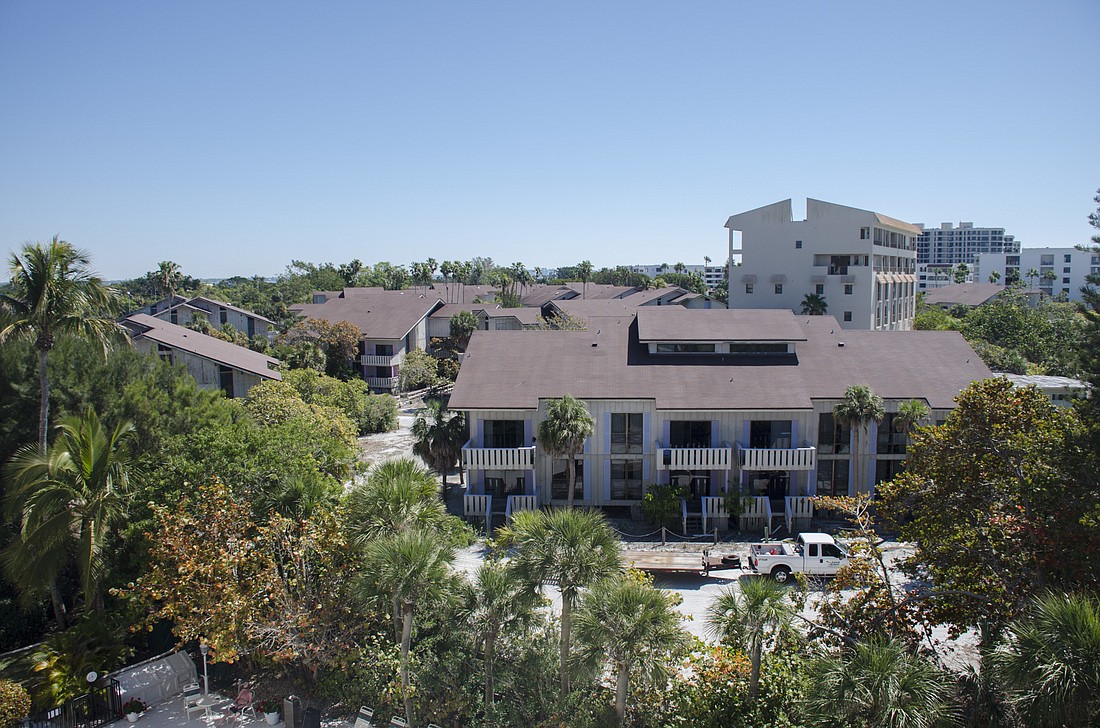- May 3, 2025
-
-
Loading

Loading

There are 237 units within the chain-link fence surrounding the former Colony Beach & Tennis Resort property. Some are in better shape than others, but 237 is the number.
Unicorp National Developments, an Orlando-based company that’s proposed putting a St. Regis Hotel and Residences at 1620 Gulf of Mexico Drive, wants to build 244 units in their place — 166 for a hotel and 78 as condominiums.
But, as has become evident in recent weeks and months, it’s not a simple matter of asking the town for seven extra units, scheduling a ceremonial groundbreaking and calling in the heavy equipment.
Why?
Short answer: It’s complicated. The long answer begins with the former resort’s nonconforming status. In a nutshell, because the developer wants to build something new and not simply rebuild what’s there, he has to follow existing rules, not those in force when Colony was built.
The resort complex, constructed in the early 1970s, was established before the Town Commission ratified strict zoning codes in 1984, designed to avert the possibility of runaway development.
In the case of the Colony property, it was zoned in 1984 as T-6: T for tourism, 6 for six units per acre.
Much like other buildings and condominium communities built before the new rules, the Colony was allowed to remain as a nonconforming property with more units per acre than allowed by the retooled zoning codes. If everything remains as is, the building may stand as nonconforming. Redevelop the property and the new codes take effect.
It’s an issue that’s becoming more relevant as older properties begin falling behind with the demands of the real estate and tourism markets.
Town codes allow a property to retain its nonconforming status for one year after a property is “abandoned,” according to town staff report. But commissioners may extend that deadline, staff wrote in its report, a process that has kept the property at 1620 Gulf of Mexico Drive at above-code density.
The Town Commission has voted time and again, at the request of the Colony Beach & Tennis Resort Association, to extend that nonconforming status for the site of the former Colony since it closed in 2010, according to a staff report about the proposed development of the site.
For a developer to keep a nonconforming density — the above code allowance, that is — on Longboat Key, it must use the units as the property did before zoning codes were changed, according to the staff report. In the case of the Colony, that was tourism.
If any developer wanted to keep the 237 units at the site of the former Colony, she or he must construct those grandfathered rooms — the 237 at the Colony that would be rebuilt — to only accommodate tourists.
That’s partly what Unicorp tried to do in 2017 with a referendum to add 180 condominium units to the 237 existing tourism units in a 12-story mixed-use project. Voters denied the proposal by a margin of more than 87%.
Now Unicorp has a new plan, one that is much smaller and seeks a much different route to approval.
Unicorp wants to dump the nonconforming units, and status, at the site of the former Colony.
Its plan is to build within the underlying T-6 density, which, through the planned unit development process it seeks, affords the Orlando-based developer 4.5 units per acre — 79 units, 78 of which Unicorp plans to use for residential condominiums.
That leaves the developer with one unit for tourism use, the minimum number required for a site to seek additional dwellings from the tourism pool.
That pool, established in 2008 at 250 units, now has 165 units left.
Unicorp wants all of them.
The only other development to seek units from the toursim pool since its 2008 inception was the Zota Beach Resort, according to the staff report.
Town commissioners, when they heard the application at their March 6 meeting, debated whether to give all the units to Unicorp for fear of losing the pool.
Commissioners questioned whether some of the voter-approve tourism units could be used somewhere else.
“Is there any way to retain some modest number with the pool?” District 4 Commissioner Jack Daly asked at the meeting. “The applicant could be asked instead of 165 to reduce it by 20, 30 or something of that nature.”
Unicorp President Chuck Whittall said in a letter to the Town Commission that without all of the 165 tourism units he’s requested, his resort will not be financially reasonable.
“It is vital that the hotel offers a total of one hundred and sixty-six (166) rooms to spread our operating costs over in order for this to be a viable investment,” Whittall wrote.
All of the 165 tourism units would disappear if the Town Commission approves an ordinance it forwarded to second reading this week. But At-Large Commissioner Jim Brown, near the end of a two-day commission meeting last week, said he wants to avoid that.
Brown said if the Commission were to give the remaining 165 tourism units to Unicorp, he would make a motion at the next meeting to allow voters to decide if they want to refill the tourism pool for future allotment by the Town Commission.
Whittall offered, in his letter, to give the town $10,000 “to be utilized for the specific purpose of advertising and organizing a community mailing to support Commissioner Brown’s idea regarding a new referendum for the replacement of the used tourism units.”
That would mean a referendum, if approved by the commission, asking residents if they would like the town’s tourism pool restocked for the benefit of future developers or tourism-site owners.
If approved, it could find its way to the November ballot.